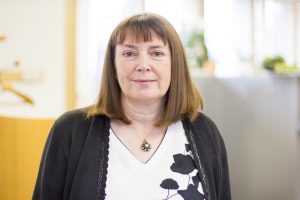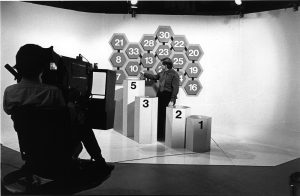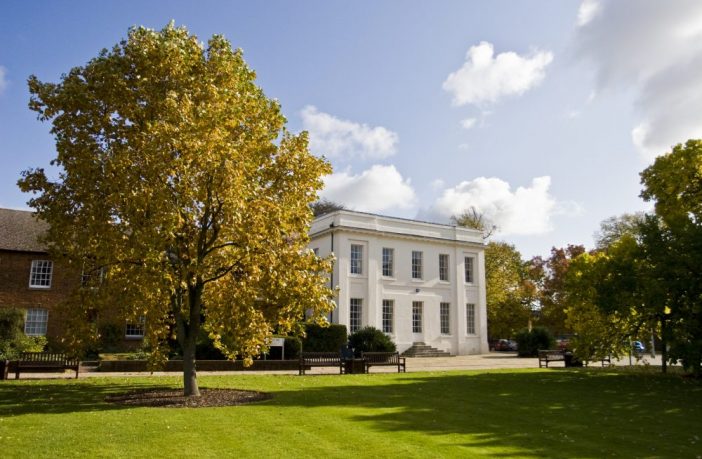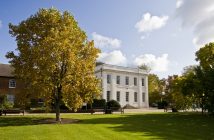By Professor Mary Kellett, Vice-Chancellor of The Open University

Prof Mary Kellett
Ridiculed and scorned at its inception, The Open University flew in the face of established Higher Education when it was founded in 1969. The bold vision of Harold Wilson, made a reality by the tenacity of Jennie Lee, created a new university which was founded on the radical principle of being ‘open to all’.
Traditionalists predicted we’d fail. No-one knew whether this ‘university of the air’ would take off or spectacularly self-destruct. How could a university with no entry requirements, and no student campus, guide the educationally disenfranchised through the demands of a degree?
It was a huge gamble, not only politically, but for those early academics who were risking their careers to join this bold experiment.
But the gamble paid off.
Since 1969, more than 2 million people have come through the OU’s virtual doors. From 24,000 students in our first intake in 1971, we now have over 174,000 people studying with us; making us one of the largest Higher Education providers in Europe and a ‘National Treasure’ in many peoples’ eyes.
Over the course of the last five decades, there’s been a seismic shift in access to Higher Education, driven by the OU – and we are still in the business of changing lives. We remain true to our founding mission – as relevant today as ever – of being open to people, places, methods and ideas.
A brave new world of learning
The OU’s method of delivery was always – and still is – different to the norm.

One of the early lectures broadcast on the BBC
From the OU’s earliest years, people fondly remember tuning in to BBC Two in the early hours of the morning for a maths lecture delivered by a kipper-tie wearing professor; and kitchens were transformed into labs as science kits, complete with items for dissection, were posted to people’s homes. Our network of Associate Lecturers – still key today to our students’ success – supported thousands of learners with residential schools, tutorials and phone calls to discuss their latest essay.
This sort of learning was absolutely new – and people embraced it in their thousands.
One of those pioneer students was John Carter, who took up study back in 1971 at the age of 47, after switching his career from the building trade to teaching. He became an inspiring and successful teacher, implementing a new economics curriculum at his school – thanks to the OU.
The changing student experience
Although grounded in revolution, the OU story is one of evolution.
The OU has always embraced the technology of the day. In the 80s, video recorders meant that students could record lectures on the BBC and watch when it suited them, and computers began to replace typewriters on desks. We even ran a course on robotics at that time, which involved sending students a stand-alone robot arm – no mean feat!
These days our students study on their mobile devices and laptops, when and where it suits them. Their textbooks are still posted out – and we still send off some science kits – but a lot has changed.
 From those late-night lectures, we now co-produce prime-time television programmes with the BBC, including blockbusters such as Civilisation, School and Blue Planet. Our academics have moved from in front of the camera to giving expert guidance to the production teams behind the scenes. These programmes not only help our students, but are shaping public debate – with Blue Planet 2 provoking wider awareness of the issue of plastic waste in our oceans.
From those late-night lectures, we now co-produce prime-time television programmes with the BBC, including blockbusters such as Civilisation, School and Blue Planet. Our academics have moved from in front of the camera to giving expert guidance to the production teams behind the scenes. These programmes not only help our students, but are shaping public debate – with Blue Planet 2 provoking wider awareness of the issue of plastic waste in our oceans.
We still ask students to conduct science experiments in their homes, but now they can also remotely access lab-grade equipment and conduct their own experiments online thanks to our multi-award winning OpenSTEM Labs. The detail students can access is truly pioneering. Students can see 40-thousand-year-old signals coming from space, experience a Mars landscape, see through a slice of rock and look a fruit fly in the eye – all without moving from their workspace.
Today’s learners can go on a virtual field trip, exploring the geology of the Peak District or immerse themselves in Augmented Reality to see a beating heart in great detail. The OU Law School is one of the first in the UK to enable law students to give real-life legal advice, under the scrutiny of solicitors, in our free, online pro-bono legal clinic.
A vital opportunity
Although much has changed technologically, our students have the same motivations and ambitions as they always had.
When the OU started, people came to us who didn’t have the chance to access a university education; many were housewives who’d eschewed formal learning to bring up a family, or those from poorer backgrounds who wanted to improve their career prospects.
Today we’re attracting people who also want to climb the ladder at work, who want to gain that much dreamed of qualification, who want to change jobs, who are self-motivated and determined. We are also proud to have more disabled students – at 23,000 – than many institutions have entire student populations.
With the current skills gaps in the UK, and the government’s intentions to develop new proficiencies in computing, engineering, maths and technology, the opportunity the OU provides is vital. We must tap into the huge potential of people who want to retrain or upskill – at whatever stage in their life they wish to do that – and make it possible for them to succeed.
40% of our students lack the qualifications they need to get into traditional university, but they are able to excel with us. Indeed a report by London Economics in the summer of 2018 found that on average, those completing a degree part time in their 30s could expect to earn £377,000 more in cash terms over the lifetime of their career.
Faye Banks is an example of how OU study can hugely impact on a career trajectory. Leaving school with no qualifications, Faye went into an unskilled job but quickly realised she wanted to achieve more. She went back to college to get GCSEs, completed a HNC in electrical engineering, and then was inspired to move her career on – which is when she signed up with the OU. Completing an MEng, MBA and other qualifications with the OU, Faye’s career has skyrocketed, and she’s now Director of Energy at Costain, a technology-based engineering company. Faye inspires other young women to join this sector by being a STEM ambassador and doing outreach through The Institution of Engineering and Technology.
Beyond the student body
The OU’s mission of extending educational opportunities to everyone still resonates today. Alongside the BBC mainstream programming, we run a huge free learning platform OpenLearn which has just celebrated 60 million visitors to its site. Free course resources, academic insights, interactives and now Badged Open Courses make this a unique higher education platform.
The OU also pioneered FutureLearn, now established as the leading social learning platform, with over 173 partners, including specialist education providers and leaders in industry across a variety of sectors. Since its inception by the OU in 2012, it is now the largest online learning platform in Europe, with almost nine million people signed up worldwide. FutureLearn uses design, technology and partnerships to create credible and flexible online courses, bringing education to a global audience.
On the international stage the social mission of the OU is as strong as ever. Projects to develop the skills of teachers in remote corners of Africa and India have made a huge impact to the education of children in those regions.
More vital than its founders could ever have imagined
It’s true that the OU story hasn’t been without a few bumps in the road. It’s no secret that times are challenging across HE; the funding changes in 2012 in England had an impact not only on the OU, but on the whole of the part-time sector. Operating across all nations of the UK, we have seen how student numbers have been maintained in Scotland and Wales, where different funding arrangements make the prospect of part-time study more viable.
But we’ve adapted to the new environment – we are one of the biggest suppliers of Degree Apprenticeships, credit transfer is smoothly done, we continue to bring new ways of teaching to our students, and we champion the needs of part time mature learners in every way that we can.
With challenges ahead such as Brexit, Artificial Intelligence, future jobs that don’t yet exist and the current skills gap, the OU has become more important than its founders could ever have imagined.
50 years on, the HE landscape is a world away from where the OU started. But the OU? Our founding principles continue to drive everything that we do – to be open to people, places, methods and ideas.
We’re still radical, still relevant and still needed – today more than ever.
This article is republished from University Business. Read the original article.



